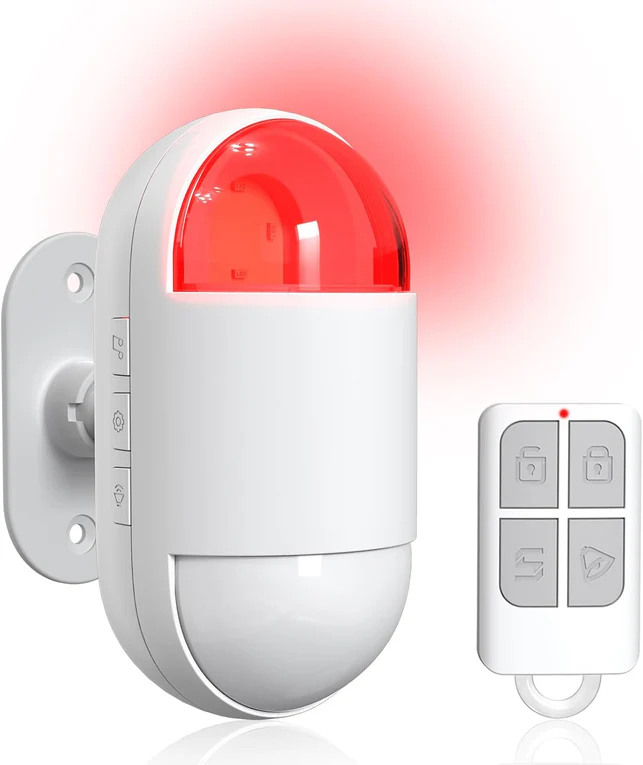Are you looking for a reliable and convenient way to protect your home? Look no further than a battery operated alarm system. As someone who has been researching and studying the endless options in home security, I know firsthand the importance of finding the right system for your specific needs. With so many choices on the market, it can be overwhelming to determine which one is best for you. That’s why I’ve created this ultimate guide to choosing the right battery operated alarm system.
In this article, we’ll cover everything from the different types of systems available, their features and benefits, as well as tips for installation and maintenance. Whether you’re a homeowner or renter, live in a house or apartment, this guide is designed to help anyone looking for reliable security solutions. So let’s get started on finding the perfect battery operated alarm system to keep you and your loved ones safe.
So, battery operated alarm system?
In today’s world, security is a top priority for many individuals and families. With the rise of technology, there are now countless options available when it comes to home security systems. One popular choice is a battery operated alarm system.
But with so many different models and features on the market, how do you choose the right one for your needs? This guide will break down everything you need to know about battery operated alarm systems, from their benefits to key factors to consider before making a purchase.
Firstly, what exactly is a battery operated alarm system? As the name suggests, this type of security system runs solely on batteries rather than being connected to an electrical outlet. This makes them ideal for those who live in areas with frequent power outages or have limited access to electricity.
One of the biggest advantages of a battery operated alarm system is its portability. Unlike traditional wired systems that require professional installation and can only be used in one location, these wireless alarms can easily be moved from room to room or even taken with you if you move homes.
Another benefit is their ease of installation. Most battery operated alarms come with simple instructions and can be set up by anyone without technical knowledge or tools. This also means they are perfect for renters who may not have permission from landlords to install permanent fixtures.
When choosing the right battery operated alarm system for your home, there are several important factors to consider:
1) Range:The range refers to how far away from the main unit sensors can be placed while still maintaining connection. Make sure that your chosen model has enough range to cover all areas of your home that require protection.
2) Sensors:Different models come with different types of sensors such as motion detectors or door/window contacts. Consider which ones would best suit your needs based on where you want them placed and what kind of activity they should detect.
3) Connectivity:Some battery operated alarms offer additional features such as remote control access via a smartphone app or integration with other smart home devices. If these are important to you, make sure the system you choose has the necessary connectivity options.
4) Battery life: It’s essential to know how long the batteries in your alarm system will last before needing replacement. Look for models that have longer battery life and consider investing in rechargeable batteries to save money in the long run.
5) Budget:As with any purchase, it’s crucial to determine your budget beforehand and stick to it. While battery operated alarms tend to be more affordable than wired systems, prices can still vary significantly depending on brand and features.
In conclusion, a battery operated alarm system is an excellent choice for those looking for a portable, easy-to-install security solution. By considering factors such as range, sensors, connectivity, battery life and budget, you can find the perfect model that meets all of your needs and provides peace of mind for you and your loved ones.
Understanding the Fundamentals of Battery Operated Alarm Systems
Battery-operated alarm systems have become a popular choice for many homeowners because they offer flexibility and reliability without the hassle of wiring. These systems operate using batteries, which means you can install them anywhere, whether it’s a door, window, or even a remote area in your garden. Imagine waking up to the soothing sound of chirping birds instead of worrying about tangled wires! The ease of installation allows anyone to set up these alarms quickly; just mount it on a wall or place it on a shelf—no special tools required.
Moreover, most battery-operated alarm systems are equipped with advanced technology that ensures your home remains protected at all times. They often come with features like motion detection sensors and built-in sirens that can alert you if someone tries to break in. Many models also provide smartphone connectivity, allowing users to receive real-time notifications when something seems off.
In addition to security benefits, these alarms require minimal maintenance since changing batteries is typically straightforward. You simply replace the old ones every few months or as needed! Overall, battery-operated alarm systems combine convenience with safety—a perfect match for modern living.
Evaluating Different Types of Battery Operated Alarm Systems
When it comes to choosing a battery-operated alarm system, there are several types available, each designed to meet various needs and preferences. Some systems use passive infrared sensors that detect movement through changes in heat. These can effectively cover larger areas but might be prone to false alarms if pets wander by. Others employ door and window sensors that alert you whenever someone opens an entry point without disarming the system first. This type is especially useful for houses with multiple access points, ensuring every entrance is protected.
Another popular choice includes smart alarm systems that connect with your smartphone or other devices via Wi-Fi or Bluetooth. These not only send notifications when triggered but also allow you to monitor your home remotely, providing peace of mind whether you’re on vacation or just at work.
In addition to these features, consider factors such as battery life and ease of installation before making a decision. A well-chosen alarm system can enhance security while being user-friendly and reliable for daily use.
Ultimately, weighing the pros and cons of different types will guide you toward finding the perfect fit for safeguarding your living space against unwanted intrusions—making every corner feel secure in its own right.

Read also: laptop linux operating system
Key Features to Consider When Choosing a Battery Operated Alarm System
When selecting a battery-operated alarm system, there are several key features that can make all the difference in ensuring your home’s safety. First and foremost, consider the sensor range. A good alarm system should have a wide detection radius to cover your entire property effectively. Look for systems that include motion sensors, door/window sensors, and even glass break detectors to create a comprehensive security network. Additionally, check how easily you can integrate other devices like cameras or smart home technology—this versatility allows you to expand your security as needed.
Another important feature is battery life. You want an alarm system with long-lasting batteries so you won’t need frequent replacements. Systems equipped with low-battery notifications can alert you when it’s time to recharge or replace them. Also consider connectivity options; some alarms offer wireless capabilities which allow for easy installation without complicated wiring. Finally, think about the user interface: a simple app or control panel makes it much easier to manage alerts and settings on-the-go. With these considerations in mind—sensor range, battery longevity, connectivity options—you’ll be better prepared to choose an alarm system that fits both your lifestyle and safety needs effortlessly.
Comparing Top Brands and Models of Battery Operated Alarm Systems
When it comes to battery-operated alarm systems, the choices can be overwhelming. Various brands offer unique features that cater to different needs and preferences. For instance, Ring has made a name for itself with its easy installation and user-friendly app. Users can monitor their homes remotely, receiving real-time notifications on their smartphones whenever motion is detected or an alarm triggers. Another popular choice is SimpliSafe, known for its customizable options. Customers appreciate that they can select specific sensors tailored to their home layout, whether it’s window sensors or cameras for outdoor security.
On the other hand, Nest focuses on integrating smart technology into home security. Their alarms work seamlessly with other smart devices like thermostats or smoke detectors, creating a cohesive system that enhances overall safety. Some notable models come equipped with features such as voice alerts and user-friendly touchscreens for quick access to settings.
When considering which system might fit best in your life, think about aspects such as connectivity options and ease of control.
- Battery lifespan
- Monitoring capabilities
- Customer service support
Taking these factors into account will help you find an alarm system that not only fits your home but also meets your peace of mind perfectly!
You may also like: dragon naturally speaking 13 download
Maintaining Your Battery Operated Alarm System: Tips and Tricks
Keeping a battery-operated alarm system in top shape is essential for your safety and peace of mind. One of the simplest ways to maintain your system is by regularly checking the batteries. It’s smart to replace them every six months, even if they seem fine. This helps avoid unexpected silence when you need it most. You can set reminders on your phone or mark it on your calendar—whatever works best for you! Additionally, look out for signs that might indicate battery issues, such as chirping sounds or flashing lights on the device. These little alerts are like a friendly nudge from the system itself.
Another important aspect is ensuring that all parts of the alarm are clean and free from dust or debris. Use a soft cloth to gently wipe down sensors and control panels; this keeps everything working efficiently.
Besides cleaning, make sure to test your alarm periodically as well—about once a month is ideal! This way, you’ll know it’s functioning correctly when you really need it.
- Check sensor placement to ensure full coverage.
- Review user manuals for any specific maintenance tips.
By taking these small yet significant steps, you’re not only protecting yourself but also prolonging the life of your alarm system.



